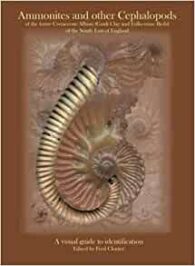By David Rayner, Tony Mitchell, Martin Rayner and Frederick Clouter

I suppose it was the Gault of Copt Point in Folkestone that really got me back into fossil collecting, after a long hiatus. The website, Fossils of the Gault Clay & Folkestone Beds of Kent, UK, has been around for many years and has won is creator Jim Craig (now sadly deceased) some very important awards. However, websites are transitory in nature and may not be accessible forever. Therefore, by using the website images, Fred Clouter has developed a guide for the identification of the ammonites figured on the website, as well as the nautilus and belemnite species that can be usually found when scrambling around in the mud.
As I pointed out in my review of London Clay Fossils of Kent and Essex, everyone of the small number of books published by the Medway Fossil and Mineral Society are without exception, wonderful. Ammonites and other Cephalopods of the lower Cretaceous Albian (Gault Clay) and Folkestone beds of the South East of England is no exception. There are seventy one pages of full colour pictures of the fossils that can be found at this prolific site on the south coast, a short walk from Folkestone.
The guide features:
- Explanations about the Gault Clay.
- The stratigraphy of Copt Point (near Folkestone) and the position of the various beds.
- Information about the cephalopods that can be found (that is, ammonites, nautili and belemnites).
- The terminology used to describe them, with a glossary.
- Sections for the visual identification of a wide variety of species.
Obviously, the list is not, and cannot be, inclusive of all the species found in the Gault clay. However, the guide includes all of the major families and some very rare specimens. This little book is intended for the average collector but, where possible gives full detail of Family, sub- family, genus, species and horizon, and location.
If you can, get a copy (they can be found at http://www.gaultammonite.co.uk/Pages/new_book.htm). Regardless of whether you visit Copt Point – which also happens to be an old, Victorian sewerage outlet to the east of Folkestone harbour – the book will be a beautiful addition to your collection.
Other good books, which compliment this guide, are:
- Fossils of Folkestone, Kent, by Philip Hadland.
- Fossils of the Gault Clay: Palaeontological Society Field Guide to fossils No 12, edited, by Jeremy R Young, Andrew S Gale, Robin I Knight and Andrew B Smith.
Ammonites and other Cephalopods of the lower Cretaceous Albian (Gault Clay) and Folkestone beds of the South East of England, by David Rayner, Tony Mitchell, Martin Rayner and Frederick Clouter, Medway Lapidary & Mineral Society (2007), 80 pages (paperback), ISBN: 978-09538243-2-8.


